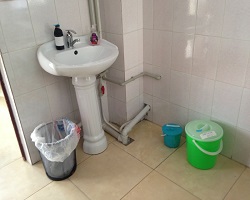Water, sanitation and hygiene in health care facilities

WHO
Safe water, sanitation and hygiene (WASH) in health care facilities are essential for providing safe people-centred health services and for maintaining the dignity of people. Such services are key elements of quality within the context of universal health coverage. Quality health care cannot exist without reliable access to safe WASH facilities. Reliable data about the provision of WASH services in health care facilities in the WHO European Region is scarce. Effectively and sustainably improving WASH services in such facilities is a priority under the Protocol on Water and Health. The Protocol is the primary multilateral agreement in the WASH domain for the Region. It provides a practical platform for policy dialogue and facilitates the development of integrated policies and targets to achieve universal access to WASH in institutions.
Adequate WASH in health care facilities is important because:
- it is a human right;
- it is essential for ensuring quality health care;
- it contributes to the reduction of health care costs by protecting the health of staff and preventing hospital-acquired infections;
- it contributes to disease prevention and promotes health and well-being, especially for children and mothers;
- it helps to control and reduce the spread antibiotic resistant pathogens by reducing the need for antibiotic use;
- it prevents contamination of the environment by ensuring the safe management of wastewater and medical waste.
Our work
In March 2018, the United Nations Secretary-General, António Guterres, issued a global call for greater leadership and accountability to prioritize WASH in all health care facilities, as a prerequisite for quality care. Following this call to action, WHO and the United Nations Children’s Fund (UNICEF) established a set of global targets and metrics aimed at achieving universal WASH services in health care facilities. To facilitate this process, 8 practical steps have been identified, such as undertaking national assessments, developing national roadmaps and setting implementation targets.
WHO/Europe supports countries in setting targets towards achieving adequate WASH services that ensure quality health care, developing informed policies and strengthening surveillance systems. WHO engages governments in capacity-building initiatives and supports deep-dive analysis to capture mechanisms that support WASH improvements and identify enablers and challenges to sustainable improvement. WHO also promotes the application of the facility improvement tool, WASH FIT, to identify and prioritize facility-based improvements.
Commitments
World Health Assembly resolution WHA72.7 on WASH in health care facilities, which was adopted at its 72nd session in May 2019, stresses the fundamental importance of adequate WASH services in achieving universal health care. It also re-emphasizes attainment of WASH-related commitments, as expressed in SDG 3 on ensuring and promoting health and well-being, and SDG 6 on safe, adequate and equitable water and sanitation for all. Member States in the European Region also reinforced these commitments in the Ostrava Declaration on Environment and Health (2017) that mandates countries to stipulate actions towards ensuring and sustaining the provision of adequate WASH services in health care facilities as one of the environmental health priorities in the Region.



